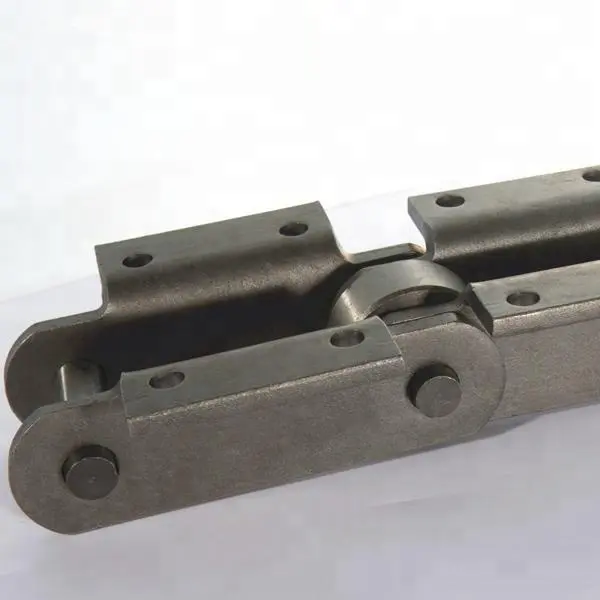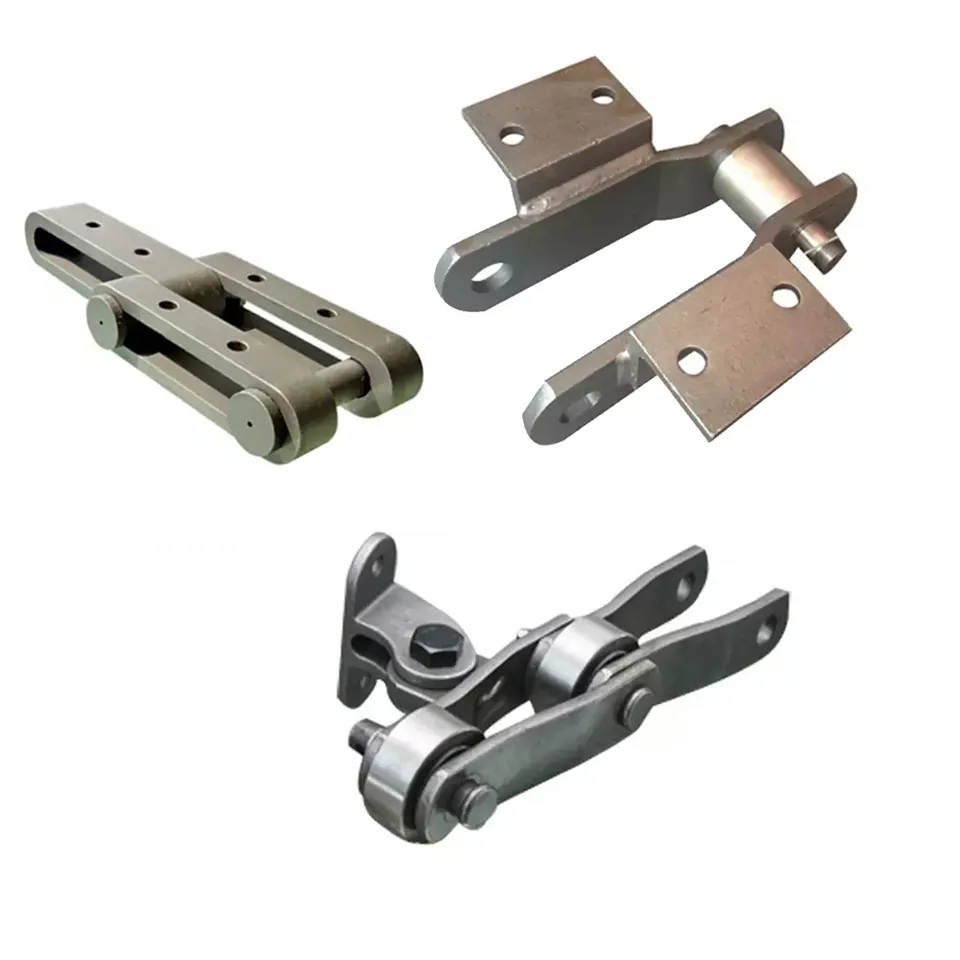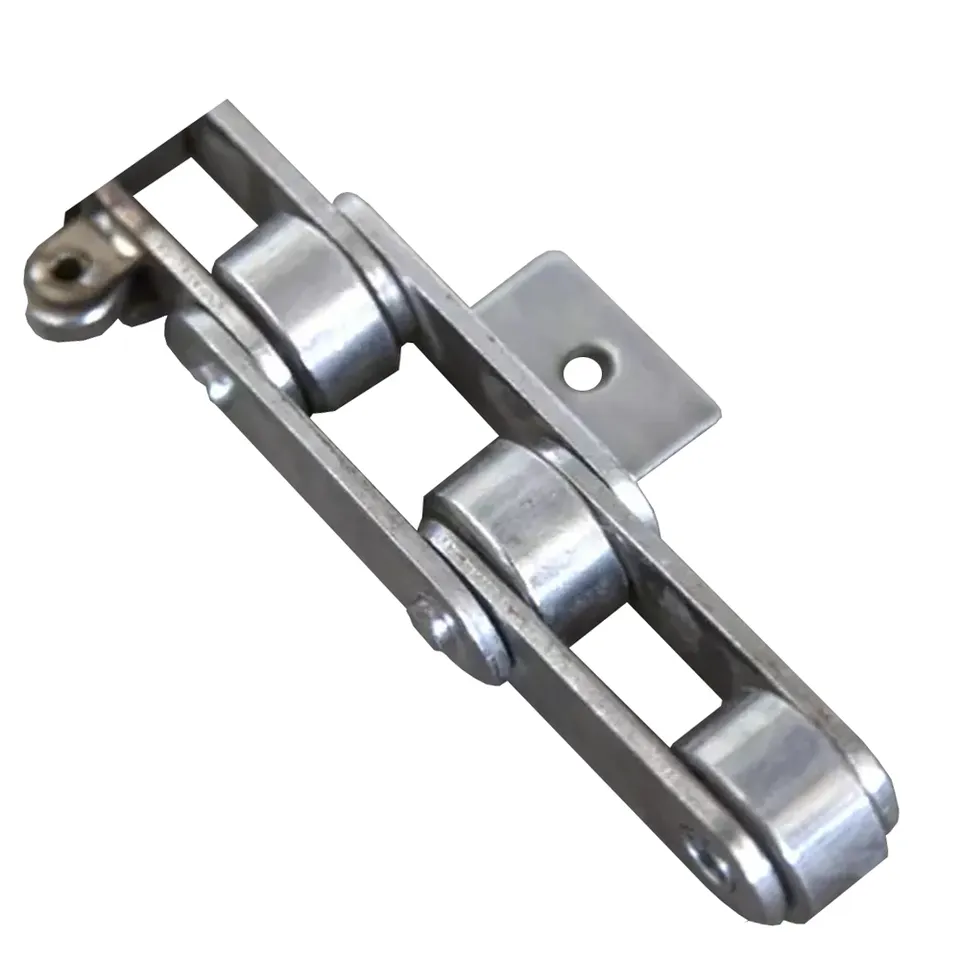Product Description
CHINAMFG rollers enhance rotation on the bushing while reducing impact loads on the sprocket tooth during operation.
All components are heat treated to achieve maximum strength.
Pre-loaded during the manufacturing process to minimize initial elongation.
Hot dipped lubrication ensures 100% lubrication of all chain components to extend wear life and reduce maintenance costs.
| CHAIN NO. |
PITCH | BUSH WIDTH |
ROLLER DIA |
PIN | PLATE | DIMENSION OF ATTACHMENT | MIN. TENSILE STRENGTH |
|||||
| d | L | h | T | |||||||||
| mm | mm | mm | mm | mm | mm | mm | H | d3 | E | F | kgf | |
| NSE200 | 100.00 | 51.80 | 44.50 | 19.10 | 111.50 | 60.00 | 10.00 | 150.00 | 18.00 | 100.00 | 105.00 | 420 |
| NSE300 | 100.00 | 57.60 | 48.50 | 22.23 | 120.00 | 75.00 | 7.50 | 150.00 | 18.00 | 100.00 | 105.00 | 520 |
| NSE400 | 125.00 | 67.40 | 63.50 | 31.75 | 139.30 | 90.00 | 12.00 | 180.00 | 18.00 | 125.00 | 130.00 | 735 |
| NSE500-1 | 125.00 | 75.00 | 70.00 | 35.00 | 170.00 | 100.00 | 16.00 | 180.00 | 18.00 | 125.00 | 130.00 | 980 |
| NSE500-2 | 125.00 | 75.00 | 71.50 | 36.00 | 165.00 | 102.00 | 16.00 | 180.00 | 18.00 | 125.00 | 130.00 | 1200 |
| NSE600H | 125.00 | 75.00 | 75.00 | 40.00 | 165.00 | 105.00 | 16.00 | 185.00 | 18.00 | 125.00 | 136.00 | 1260 |
| NSE700 | 150.00 | 85.00 | 85.00 | 48.00 | 180.00 | 125.00 | 16.00 | 226.00 | 22.00 | 150.00 | 165.00 | 1470 |
| Usage: | Transmission Chain, Conveyor Chain, Dedicated Special Chain |
|---|---|
| Material: | Alloy/Carbon Steel |
| Surface Treatment: | Polishing |
| Feature: | Heat Resistant |
| Chain Size: | 2 3/4"*3" |
| Structure: | Roller Chain |
| Samples: |
US$ 10/Meter
1 Meter(Min.Order) | |
|---|
| Customization: |
Available
| Customized Request |
|---|
Can mill chains be used in material handling and conveyor systems in factories?
Yes, mill chains can be used in material handling and conveyor systems in factories. Mill chains are versatile and robust, making them well-suited for various industrial applications, including material handling and conveying. Here’s why mill chains are suitable for such systems:
Durability: Mill chains are designed to withstand heavy loads and continuous operation, making them ideal for material handling tasks in factories. They are made from high-quality materials, such as carbon steel or stainless steel, which provide excellent strength and durability.
High-Capacity: Mill chains have high load-carrying capacities, allowing them to handle large quantities of materials. This makes them suitable for use in conveyor systems where substantial material transfer is required, such as in assembly lines or bulk material handling processes.
Customization: Mill chains can be customized to fit specific conveyor system requirements in factories. They are available in various sizes and configurations, allowing for tailored solutions to match the application’s needs.
Smooth Operation: Mill chains offer smooth and reliable operation in material handling and conveying applications. Their design and construction contribute to reduced friction and wear, resulting in less downtime and lower maintenance costs.
Compatibility: Mill chains are compatible with standard sprockets, which simplifies the integration process into existing conveyor systems in factories. This compatibility also makes it easier to replace worn or damaged chains when necessary.
Cost-Effective: Considering their durability and long service life, mill chains offer a cost-effective solution for material handling and conveying in factories. They require less frequent replacement and maintenance, leading to reduced overall operational costs.
Overall, mill chains are a reliable and efficient choice for material handling and conveyor systems in factories, contributing to smooth and productive processes in industrial environments.
What are the safety considerations when using mill chains in industrial settings?
Safety is of utmost importance when using mill chains in industrial settings. Proper maintenance, installation, and operation are crucial to ensure the safe and efficient functioning of the equipment. Here are some key safety considerations:
1. Training and Education: Workers operating and maintaining the mill chains should receive proper training and education on equipment handling, safety protocols, and emergency procedures.
2. Personal Protective Equipment (PPE): Operators and maintenance personnel should wear appropriate PPE, such as safety gloves, safety goggles, and protective clothing, to prevent injuries during handling and maintenance.
3. Regular Inspections: Conduct routine inspections of the mill chains to identify any signs of wear, damage, or malfunction. Address any issues promptly to avoid potential accidents.
4. Lubrication: Proper and regular lubrication of the mill chain is essential to reduce friction and wear. However, ensure that lubricants used are compatible with the application and do not pose any health hazards.
5. Load Capacity: Do not exceed the recommended load capacity of the mill chain. Overloading can lead to premature failure and accidents.
6. Guarding: Install appropriate guards and safety devices to prevent accidental contact with moving parts of the mill chain and reduce the risk of entanglement.
7. Emergency Stop Devices: Equip the mill chain system with emergency stop devices that allow workers to quickly halt the operation in case of emergencies or potential hazards.
8. Handling Hazardous Materials: If the mill chain is used in handling hazardous materials, ensure that proper containment and safety measures are in place to prevent spills and exposures.
9. Environmental Considerations: Be mindful of the environmental impact of using mill chains. Follow proper waste disposal procedures and consider eco-friendly alternatives when applicable.
10. Compliance with Regulations: Ensure that the mill chains and associated equipment comply with relevant safety regulations and standards set by regulatory authorities.
By adhering to these safety considerations and maintaining a proactive safety culture, the risk of accidents and injuries in industrial settings can be significantly reduced, creating a safer and more productive work environment.
What are the noise and vibration characteristics of mill chains during operation?
During operation, mill chains may exhibit certain noise and vibration characteristics, which can vary depending on the specific design, condition, and application. Here are some key points to consider:
Noise Characteristics:
1. Rattling or Clanking: In some cases, mill chains may produce a rattling or clanking noise during operation. This noise can be caused by the impact of chain links or attachments as they move along the sprockets or other components.
2. Continuous Hum: Mill chains in well-maintained systems may produce a continuous humming sound, especially in higher-speed applications. The humming noise is often a result of the smooth and consistent movement of the chain links.
Vibration Characteristics:
1. Periodic Vibration: Mill chains can generate periodic vibrations as they pass over sprockets and other components. The vibration frequency is typically related to the chain’s speed and the number of teeth on the sprockets.
2. Smooth Operation: Well-lubricated and properly tensioned mill chains usually exhibit smoother operation with minimal vibration. Proper maintenance is essential to reduce excessive vibration and noise levels.
Noise and Vibration Management:
Excessive noise and vibration in mill chain systems can lead to increased wear, fatigue, and reduced efficiency. To manage noise and vibration:
1. Regular Maintenance: Ensure regular inspection, lubrication, and tensioning of the mill chains to minimize wear and reduce noise levels.
2. Chain Condition: Replace any worn or damaged chain links, sprockets, or attachments to maintain smooth and quiet operation.
3. Proper Tension: Maintaining the correct chain tension is crucial to prevent excessive vibration and noise. Too much tension can lead to increased stress, while too little tension may cause chain slippage and impact noise.
4. Quality and Design: Select high-quality mill chains designed for the specific application. Chains with precision engineering and anti-vibration features can help reduce noise and vibration levels.
Overall, managing noise and vibration in mill chain systems is essential for optimizing performance, reducing maintenance costs, and ensuring a safer working environment.
editor by CX 2023-10-08




